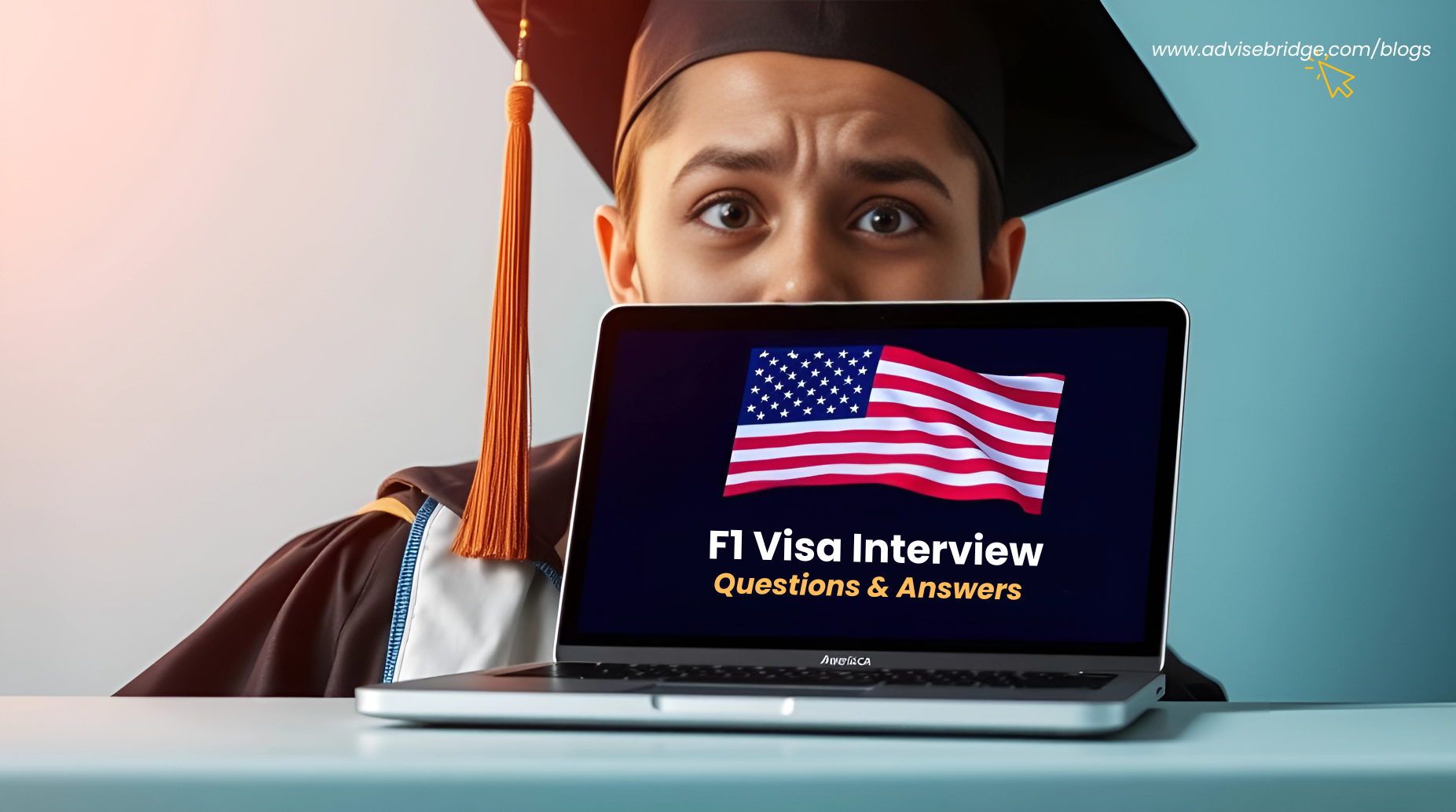The F1 visa interview is one of the most critical steps for international students planning to study in the United States. This brief yet important conversation not only verifies your academic plans and financial preparedness but also tests your intent to return to your home country after completing your studies.
Whether you’re a first-time applicant or reapplying, thorough preparation is the key to success. Let's get you to some of the most asked F1 Visa Interview questions along with their answers in our today's article.
Overview of the F1 Visa Interview Process
Typically held at a U.S. consulate or embassy, the F1 visa interview lasts about five to ten minutes. During this time, consular officers focus on three main areas:
Study Plans: Understanding why you chose a particular program and how it relates to your future career.
Financial Stability: Ensuring that you have the funds to support your tuition and living expenses.
Ties to Home Country: Confirming that you have strong ties that will bring you back home after your education.
Each of these aspects helps the officer determine if you genuinely plan to study and return to your country upon graduation.
Basic F1 Visa Interview Questions and Sample Answers
Your preparation should start with familiarizing yourself with common interview questions. However, it’s just as important to be ready for more in-depth and recent queries that reflect changes in academic trends, technology, and global circumstances.
Let’s expand on both the basic and latest questions you might encounter. Remember, these are just a sample to give you an idea, you have to prepare the answers on your own.
Questions about Study Intentions
Why have you chosen to study in the United States?
Answer: “I believe the U.S. offers the best academic resources, innovative research facilities, and a multicultural environment that will greatly enhance my education. My chosen program at [University Name] is well-aligned with my career aspirations in [Your Field].”What program and university have you chosen, and why?
Answer: “I’ve chosen the Master’s in Computer Science at [University Name] because of its strong emphasis on artificial intelligence research. The program’s curriculum is tailored to address emerging technologies that are shaping our future.”How does this program align with your career goals?
Answer: “This program will equip me with advanced technical skills and practical experience, which are essential for my goal of becoming a data scientist. I plan to leverage these skills in the tech industry back home.”
Questions on Financial Preparedness
How do you intend to cover your tuition and living expenses?
Answer: “I have secured a combination of personal savings, educational loans, and a partial scholarship from [Sponsoring Organization]. I’ve also prepared all required documents, including bank statements and sponsorship letters.”Who is financing your education?
Answer: “My education is being financed by a mix of family support and an academic scholarship awarded based on my past achievements.”Do you have proof of sufficient funds?
Answer: “Yes, I have organized all the necessary financial documents, including bank statements and scholarship award letters, to demonstrate my financial stability.”
Questions on Ties to Home Country
Do you have family or property ties back home?
Answer: “Absolutely. I have strong family connections, and my parents own a family business. I plan to apply the skills I learn in the U.S. to contribute to our business’s expansion when I return.”What are your plans after graduation?
Answer: “After graduation, I intend to work in my home country’s growing tech sector. I’m committed to using my international experience to drive innovation locally.”
Latest F1 Visa Interview Questions (2025 Edition)
As studying in the USA is getting on a tougher side, interviewers are now asking more detailed questions that gauge not only your academic readiness but also your adaptability and awareness of current trends.
Here are some of the newer, in-depth questions you might face along with sample answers.
Questions on Academic and Research Fit
How have recent trends in your field influenced your decision to pursue this program?
Answer: “Recent advancements in renewable energy technology have greatly influenced my decision. I’m excited about the research opportunities available at [University Name] in sustainable engineering, which aligns with my long-term goal of innovating eco-friendly solutions.”Can you discuss any research projects or academic work that you plan to continue or start in the U.S.?
Answer: “During my undergraduate studies, I worked on a project related to machine learning algorithms. In the U.S., I plan to join a research lab that focuses on developing intelligent systems to address real-world problems, such as climate change and urban sustainability.”
Questions on Adaptability and Global Perspective
How do you plan to adapt to the hybrid learning environments and evolving digital platforms in U.S. universities?
Answer: “I’m very comfortable with technology and have already taken several online courses. I’m looking forward to the hybrid model because it offers flexibility and the opportunity to engage with global experts through digital platforms.”What steps have you taken to understand the U.S. education system and campus culture?
Answer: “I’ve attended virtual campus tours and webinars hosted by [University Name]. I’ve also connected with current students via social media to get firsthand insights into academic life and cultural diversity on campus.”
Questions on Future Contributions and Community Engagement
How do you plan to contribute to both your academic community in the U.S. and your home country after graduation?
Answer: “I plan to actively participate in academic seminars and workshops during my studies, contributing ideas and collaborating on projects. After graduation, I aim to establish a technology incubator in my home country to foster innovation and support local startups.”What are the potential challenges you foresee in adjusting to life in the U.S., and how will you overcome them?
Answer: “Adapting to a new cultural and academic environment can be challenging. I’ve prepared by learning about U.S. cultural norms and academic expectations. I also plan to join student organizations and seek support from university counseling services to ease the transition.”
Questions on Career and Long-Term Vision
How will your education in the U.S. impact your career trajectory, especially considering current global challenges?
Answer: “Studying in the U.S. will provide me with a global perspective and exposure to innovative practices, which are critical in today’s interconnected world. This experience will enhance my ability to solve complex problems and drive sustainable growth in my home country.”What specific skills do you hope to gain that are currently in high demand globally?
Answer: “I am particularly interested in developing advanced data analytics and project management skills. These are in high demand worldwide, and I believe they will open up numerous career opportunities, both in the U.S. and internationally.”
Tips for a Successful F1 Visa Interview
Preparation Strategies
Research Thoroughly: Familiarize yourself with both the basic and advanced questions. Knowledge of current academic and global trends can set you apart.
Organize Your Documents: Ensure that you have all required documents—from financial statements to academic records—ready and well-organized.
Practice Makes Perfect: Engage in mock interviews with friends, family, or mentors to refine your responses and boost your confidence.
Presentation Skills
Dress Professionally: Choose business casual or formal attire to create a positive first impression.
Maintain Composure: Speak clearly, maintain eye contact, and ensure your body language conveys confidence.
Be Honest and Concise: While detailed responses are appreciated, always stay true to your genuine intent and keep your answers to the point.
Navigating Your Path to Success
The F1 visa interview is more than just a formality; it’s a crucial opportunity to present your academic aspirations and future plans in the best light. By preparing both basic and in-depth responses that address your study intentions, financial preparedness, and ties to your home country, you can navigate this interview with confidence.
Remember, the goal is to demonstrate that you are not only ready for the challenges of studying abroad but also committed to returning home to contribute to your community.
Good luck on your F1 visa interview, and may your educational journey in the United States be as rewarding as you envision it to be! For any queries and questions related to Study in USA or F1 visa interview, you can always connect with us at inquiry@advisebridge.com.







